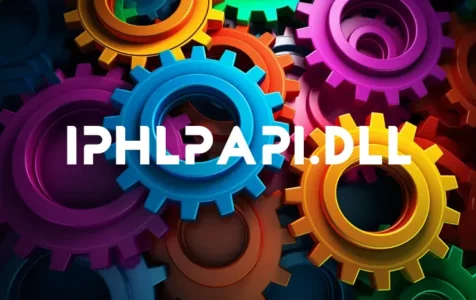Introduction to IPHLPAPI.DLL
IPHLPAPI.DLL is a Dynamic Link Library (DLL) file integral to the Windows operating system. It stands for IP Helper API and is responsible for providing network-related functions and services to various applications. This DLL file comes bundled with the Windows OS and is not something users usually interact with directly. It operates silently in the background, enabling smooth network operations.
Is IPHLPAPI.DLL Safe?
IPHLPAPI.DLL is a legitimate and safe system file provided by Microsoft Corporation. It’s necessary for the proper functioning of your PC’s networking capabilities. In general, as it is a system process, it is not recommended to stop or remove it.
However, like any file on your computer, it can potentially be corrupted or replaced by a malicious version, which could be a virus or malware. Therefore, any errors or changes to this file should be approached with caution.
Common Issues with IPHLPAPI.DLL and Their Solutions
While IPHLPAPI.DLL is important for your system, it can sometimes cause problems. Here are some common issues associated with this file and how to fix them:
Expert Tip: For smoother PC performance, consider using a PC optimization tool. It handles junk files, incorrect settings, and harmful apps. Make sure it's right for your system, and always check the EULA and Privacy Policy.
Special offer. About Outbyte, uninstall instructions, EULA, Privacy Policy.
1. DLL File Missing or Not Found: This error message usually appears when the file is deleted or corrupted. This can happen due to various reasons, including improper software uninstalls, updates, or malware corruption.
2. Bad Image Error: Users may encounter a “Bad Image” error concerning IPHLPAPI.DLL. This typically suggests the file is either not designed to run on Windows or has an error, often indicating corruption.
Fixing IPHLPAPI.DLL Issues
Run an SFC and DISM Scan:
– To repair system file corruption, you can run System File Checker (SFC) and Deployment Image Servicing and Management (DISM) scans.
– Open Command Prompt as an administrator.
– Type `sfc /scannow` and press Enter to run SFC.
– After SFC completes, type `DISM /Online /Cleanup-Image /RestoreHealth` and press Enter to run DISM.
Check for Malware:
– Perform a full scan for viruses using your preferred antivirus or the built-in Windows Defender.
– This ensures no malware is masquerading as IPHLPAPI.DLL.
Performing a Memory Test:
– Run Windows Memory Diagnostic tool to check for any RAM-related issues.
– Press Win + R, type `mdsched.exe`, and choose to restart and check for problems.
Use System Restore:
– If you have a system restore point created before problems with IPHLPAPI.DLL began, you can roll back to that state, undoing recent changes that might have caused the issue.
– Type `create a restore point` in Search, and follow the prompts to perform a system restore.
Reset Windows:
– As a last resort, if no other fixes work, you might consider resetting Windows. This reinstalls Windows but may cause loss of data, so it’s crucial to back up important files first.
User Experiences and Community Discussions
There are many community discussions where users have expressed their concerns and solutions regarding IPHLPAPI.DLL issues. Some common themes include confusion about where to locate the file, how to replace it, and how to ensure they’re not downloading a malicious version. You can join such discussions for personalized advice from tech experts and experienced community members.
Conclusion
IPHLPAPI.DLL plays a key role in your computer’s networking capabilities. While it is safe and necessary, when issues with it arise, they typically require a methodical approach to resolve. The aforementioned solutions are among the most recommended by experts and experienced users alike. Always remember to maintain regular backups of your system to avoid data loss during system recovery processes.
